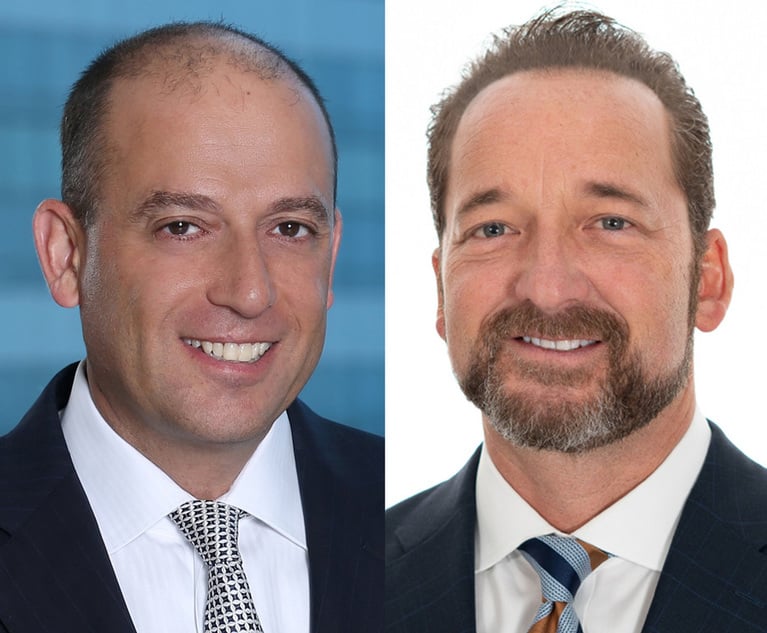 Credit: Patrick Daxenbichler/Adobe Stock
Credit: Patrick Daxenbichler/Adobe Stock Fight Over Fla.'s Social Media Law Teed Up Again
A battle about a 2021 Florida law that placed restrictions on social media platforms will get a more detailed look from a federal district judge.
August 19, 2024 at 01:01 PM
4 minute read
A battle about a 2021 Florida law that placed restrictions on social media platforms will get a more detailed look from a federal district judge.
Pointing to a U.S. Supreme Court decision, the 11th U.S. Circuit Court of Appeals on Friday sent the case back to U.S. District Judge Robert Hinkle, who in 2021 issued a preliminary injunction to block the law on First Amendment grounds. The Atlanta-based appeals court in 2022 upheld most of Hinkle's decision.
But on July 1, the Supreme Court vacated the appeals court ruling and sent the lawsuit back for further consideration. The Supreme Court did not resolve the constitutional issues but said the 11th Circuit and another appeals court in a similar Texas case did not properly consider the "facial nature" of challenges to the laws, a critical element in deciding whether they met constitutional muster.
"To make that judgment, a court must determine a law's full set of applications, evaluate which are constitutional and which are not, and compare the one to the other. Neither court performed that necessary inquiry," Justice Elena Kagan wrote in the main opinion.
In a two-paragraph order Friday, the 11th Circuit said it was sending back the Florida case "in full to the district court for further proceedings consistent with the Supreme Court's opinion." It did not give additional explanation, but social media industry groups quickly requested a conference before Hinkle and argued that the 2021 injunction should remain in effect as the case continues.
As of Monday morning, the state and Hinkle had not responded to the request, according to a court docket.
Gov. Ron DeSantis and the Republican-controlled Legislature approved the law after Facebook and Twitter, now known as X, blocked former President Donald Trump from their platforms after Trump supporters stormed the U.S. Capitol on Jan. 6, 2021.
The law, for example, prevented platforms from banning political candidates from their sites and required companies to publish—and apply consistently—standards about issues such as banning users or blocking their content. The law applied to social media platforms that have annual gross revenue of over $100 million or more than 100 million monthly active users. Companies could face steep penalties for violating the restrictions.
The industry groups NetChoice and the Computer & Communications Industry Association challenged the constitutionality of the law. After the rulings by Hinkle and the 11th Circuit, Florida went to the Supreme Court.
Though the Supreme Court did not rule on the First Amendment issue as it sent the Florida and Texas cases back for closer looks, justices addressed speech issues.
The Florida and Texas cases "present a complex clash between two novel state laws and the alleged First Amendment rights of several of the largest social media platforms," Justice Ketanji Brown Jackson wrote in an opinion that concurred in part with the main opinion.
"Some things are already clear. Not every potential action taken by a social media company will qualify as expression protected under the First Amendment. But not every hypothesized regulation of such a company's operations will necessarily be able to withstand the force of the First Amendment's protection either. Beyond those broadest of statements, it is difficult to say much more at this time," she wrote.
After the Supreme Court ruling, the industry groups filed a motion arguing that briefs should be filed at the 11th Circuit "so that the parties can address the import of the Supreme Court's decision, whether this (appeals) court can resolve the facial challenge on this record or whether a remand to the district court is necessary, and if so, whether the preliminary injunction should remain in effect pending any necessary further proceedings."
But state lawyers in Florida Attorney General Ashley Moody's office and with the firm Cooper & Kirk PLLC filed a response that contended the case should go back to district court. It said the state has "been enjoined from enforcing SB 7072 in its entirety for three years despite no showing in the district court that NetChoice is likely to succeed on its facial challenge, as that standard is properly applied."
The response said the record in the case is "not adequate to assess the merits of NetChoice's request for an injunction."
The state's lawyers wrote, for example, that a court needs to determine which platforms would be subject to the restrictions, based on the revenue and user thresholds included in the law. Also, they said determinations about potential First Amendment violations would require findings about "different levels of editorial choice" involved in each platform's various functions.
Copyright 2024 News Service of Florida. All rights reserved. This material may not be published, broadcast, rewritten, or redistributed.
NOT FOR REPRINT
© 2024 ALM Global, LLC, All Rights Reserved. Request academic re-use from www.copyright.com. All other uses, submit a request to [email protected]. For more information visit Asset & Logo Licensing.
You Might Like
View All
Trump Media Accuses Purchaser Rep of Extortion, Harassment After Merger
4 minute read

'This Is Not a Coincidence': Lawsuit Blames Chatbot App Character.AI for Teen's Suicide
6 minute readTrending Stories
- 1Clifford Chance Hikes Partner Pay as UK Firms Fight to Stay Competitive on Compensation
- 2Judicial Conduct Watchdog Opposes Supreme Court Justice's Bid to Withdraw Appeal of Her Removal
- 3Lessons in Mediation & Negotiation: Attorneys' Reflections on Jimmy Carter
- 4Legal Issues to Watch in the US Appeals Courts in 2025
- 5Ex-MoviePass CEO Submits to Ban, Settling SEC Allegations
Who Got The Work
Michael G. Bongiorno, Andrew Scott Dulberg and Elizabeth E. Driscoll from Wilmer Cutler Pickering Hale and Dorr have stepped in to represent Symbotic Inc., an A.I.-enabled technology platform that focuses on increasing supply chain efficiency, and other defendants in a pending shareholder derivative lawsuit. The case, filed Oct. 2 in Massachusetts District Court by the Brown Law Firm on behalf of Stephen Austen, accuses certain officers and directors of misleading investors in regard to Symbotic's potential for margin growth by failing to disclose that the company was not equipped to timely deploy its systems or manage expenses through project delays. The case, assigned to U.S. District Judge Nathaniel M. Gorton, is 1:24-cv-12522, Austen v. Cohen et al.
Who Got The Work
Edmund Polubinski and Marie Killmond of Davis Polk & Wardwell have entered appearances for data platform software development company MongoDB and other defendants in a pending shareholder derivative lawsuit. The action, filed Oct. 7 in New York Southern District Court by the Brown Law Firm, accuses the company's directors and/or officers of falsely expressing confidence in the company’s restructuring of its sales incentive plan and downplaying the severity of decreases in its upfront commitments. The case is 1:24-cv-07594, Roy v. Ittycheria et al.
Who Got The Work
Amy O. Bruchs and Kurt F. Ellison of Michael Best & Friedrich have entered appearances for Epic Systems Corp. in a pending employment discrimination lawsuit. The suit was filed Sept. 7 in Wisconsin Western District Court by Levine Eisberner LLC and Siri & Glimstad on behalf of a project manager who claims that he was wrongfully terminated after applying for a religious exemption to the defendant's COVID-19 vaccine mandate. The case, assigned to U.S. Magistrate Judge Anita Marie Boor, is 3:24-cv-00630, Secker, Nathan v. Epic Systems Corporation.
Who Got The Work
David X. Sullivan, Thomas J. Finn and Gregory A. Hall from McCarter & English have entered appearances for Sunrun Installation Services in a pending civil rights lawsuit. The complaint was filed Sept. 4 in Connecticut District Court by attorney Robert M. Berke on behalf of former employee George Edward Steins, who was arrested and charged with employing an unregistered home improvement salesperson. The complaint alleges that had Sunrun informed the Connecticut Department of Consumer Protection that the plaintiff's employment had ended in 2017 and that he no longer held Sunrun's home improvement contractor license, he would not have been hit with charges, which were dismissed in May 2024. The case, assigned to U.S. District Judge Jeffrey A. Meyer, is 3:24-cv-01423, Steins v. Sunrun, Inc. et al.
Who Got The Work
Greenberg Traurig shareholder Joshua L. Raskin has entered an appearance for boohoo.com UK Ltd. in a pending patent infringement lawsuit. The suit, filed Sept. 3 in Texas Eastern District Court by Rozier Hardt McDonough on behalf of Alto Dynamics, asserts five patents related to an online shopping platform. The case, assigned to U.S. District Judge Rodney Gilstrap, is 2:24-cv-00719, Alto Dynamics, LLC v. boohoo.com UK Limited.
Featured Firms
Law Offices of Gary Martin Hays & Associates, P.C.
(470) 294-1674
Law Offices of Mark E. Salomone
(857) 444-6468
Smith & Hassler
(713) 739-1250







